Taxation Law Assignment 1: Payroll, GST, & FBT Analysis - SCU
VerifiedAdded on 2023/05/28
|8
|1360
|164
Homework Assignment
AI Summary
This assignment solution provides a detailed analysis of payroll, GST, and FBT within the context of taxation law. It includes calculations for payroll information, superannuation guarantee obligations, and GST for a horse-racing stable. The assignment identifies assessable receipts, eligible deductions, and creditable acquisitions, referencing relevant sections of the ITAA 1997 and case law. It also presents options for reporting GST and PAYG, offering a comprehensive overview of the tax implications for the business. Desklib provides access to this and many other solved assignments and study resources.
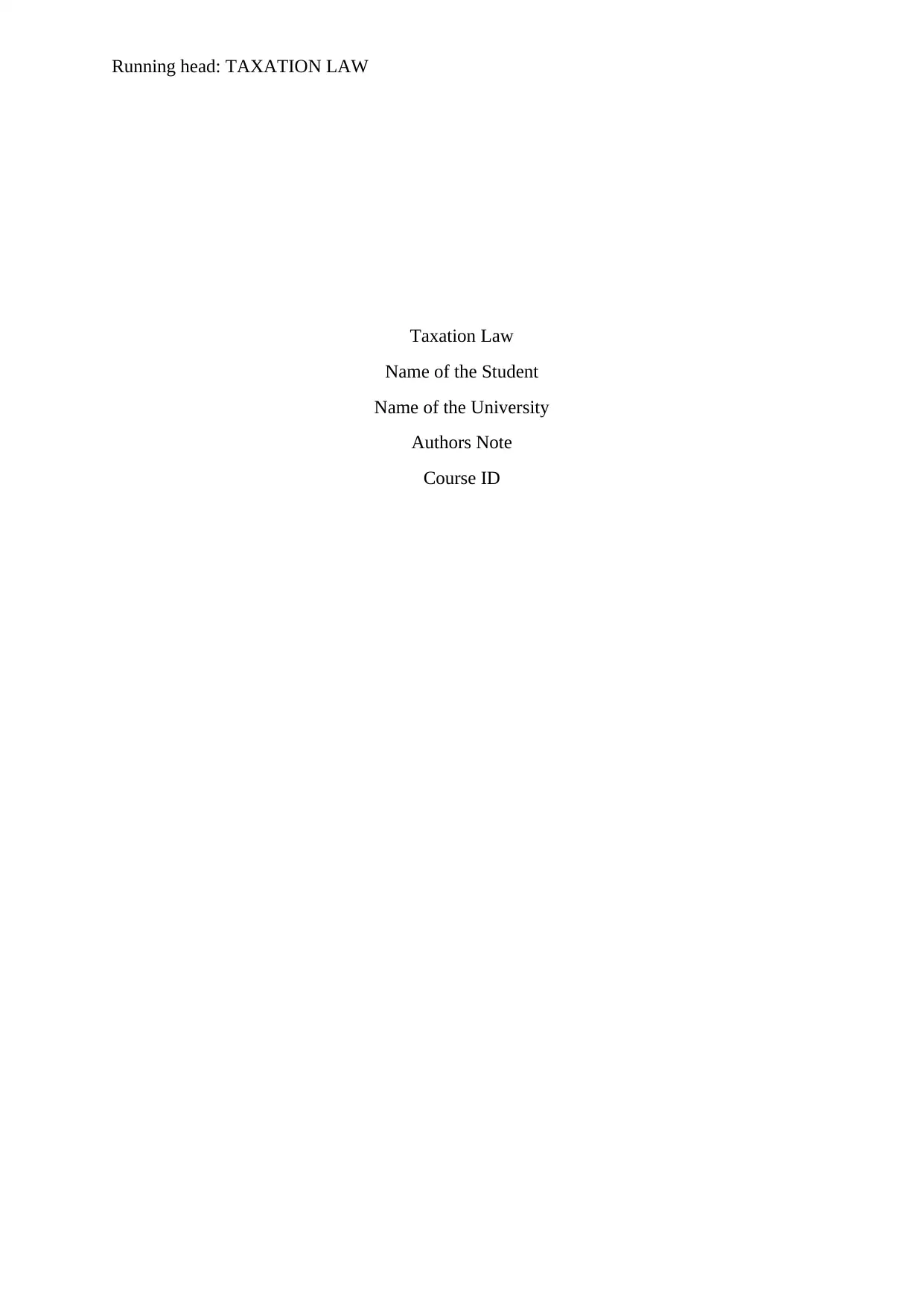
Running head: TAXATION LAW
Taxation Law
Name of the Student
Name of the University
Authors Note
Course ID
Taxation Law
Name of the Student
Name of the University
Authors Note
Course ID
Paraphrase This Document
Need a fresh take? Get an instant paraphrase of this document with our AI Paraphraser
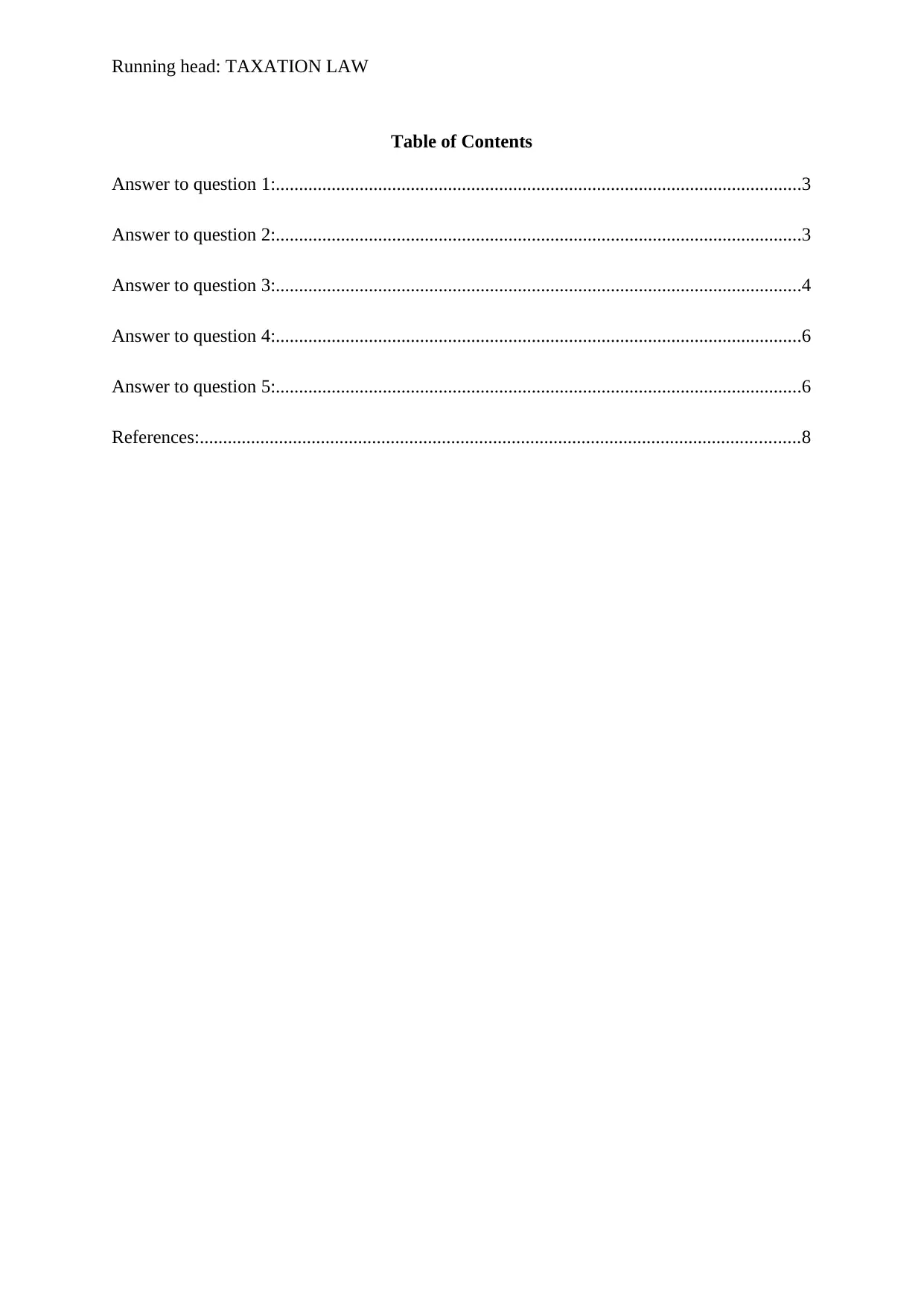
Running head: TAXATION LAW
Table of Contents
Answer to question 1:.................................................................................................................3
Answer to question 2:.................................................................................................................3
Answer to question 3:.................................................................................................................4
Answer to question 4:.................................................................................................................6
Answer to question 5:.................................................................................................................6
References:.................................................................................................................................8
Table of Contents
Answer to question 1:.................................................................................................................3
Answer to question 2:.................................................................................................................3
Answer to question 3:.................................................................................................................4
Answer to question 4:.................................................................................................................6
Answer to question 5:.................................................................................................................6
References:.................................................................................................................................8
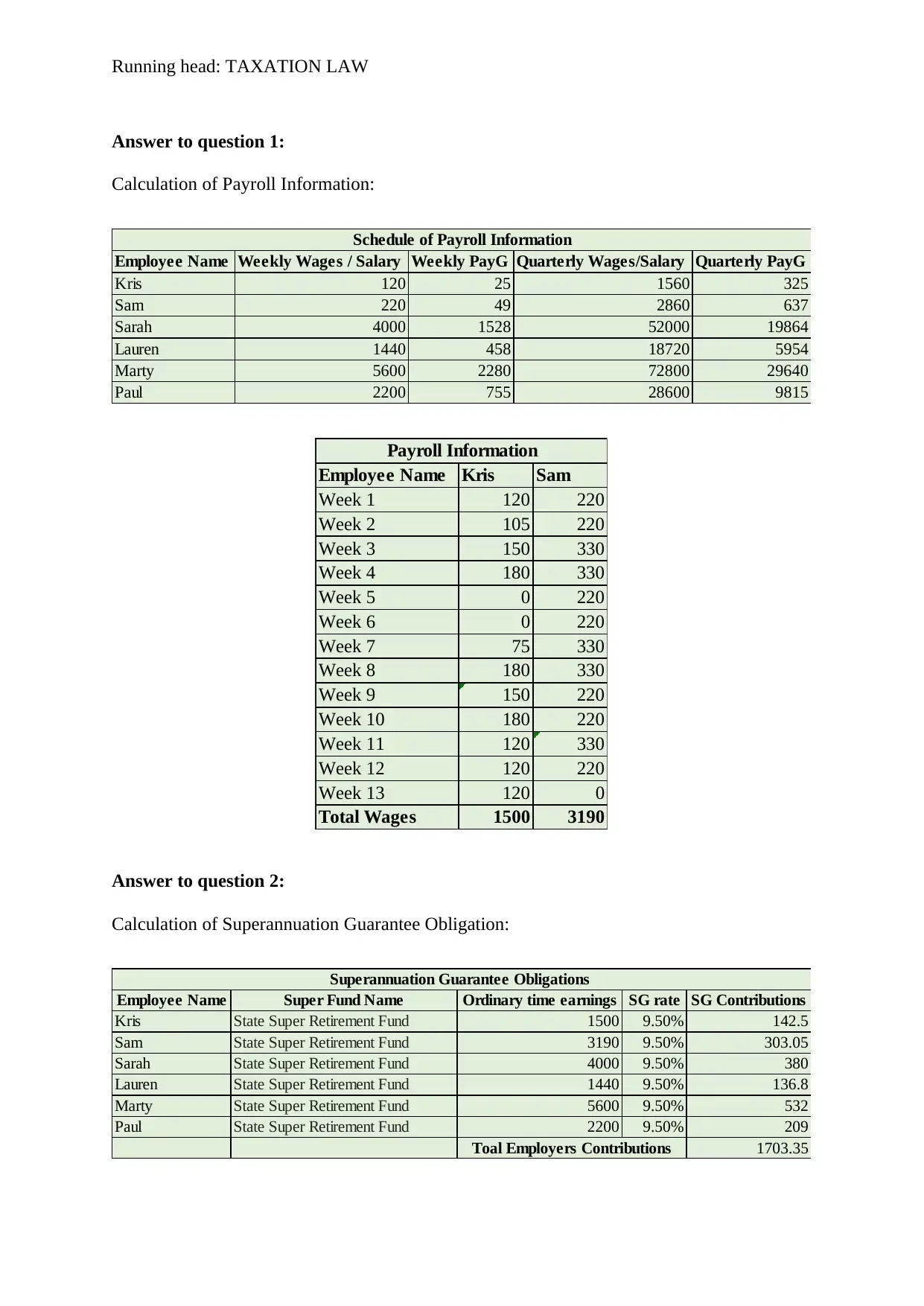
Running head: TAXATION LAW
Answer to question 1:
Calculation of Payroll Information:
Employee Name Weekly Wages / Salary Weekly PayG Quarterly Wages/Salary Quarterly PayG
Kris 120 25 1560 325
Sam 220 49 2860 637
Sarah 4000 1528 52000 19864
Lauren 1440 458 18720 5954
Marty 5600 2280 72800 29640
Paul 2200 755 28600 9815
Schedule of Payroll Information
Employee Name Kris Sam
Week 1 120 220
Week 2 105 220
Week 3 150 330
Week 4 180 330
Week 5 0 220
Week 6 0 220
Week 7 75 330
Week 8 180 330
Week 9 150 220
Week 10 180 220
Week 11 120 330
Week 12 120 220
Week 13 120 0
Total Wages 1500 3190
Payroll Information
Answer to question 2:
Calculation of Superannuation Guarantee Obligation:
Employee Name Super Fund Name Ordinary time earnings SG rate SG Contributions
Kris State Super Retirement Fund 1500 9.50% 142.5
Sam State Super Retirement Fund 3190 9.50% 303.05
Sarah State Super Retirement Fund 4000 9.50% 380
Lauren State Super Retirement Fund 1440 9.50% 136.8
Marty State Super Retirement Fund 5600 9.50% 532
Paul State Super Retirement Fund 2200 9.50% 209
1703.35Toal Employers Contributions
Superannuation Guarantee Obligations
Answer to question 1:
Calculation of Payroll Information:
Employee Name Weekly Wages / Salary Weekly PayG Quarterly Wages/Salary Quarterly PayG
Kris 120 25 1560 325
Sam 220 49 2860 637
Sarah 4000 1528 52000 19864
Lauren 1440 458 18720 5954
Marty 5600 2280 72800 29640
Paul 2200 755 28600 9815
Schedule of Payroll Information
Employee Name Kris Sam
Week 1 120 220
Week 2 105 220
Week 3 150 330
Week 4 180 330
Week 5 0 220
Week 6 0 220
Week 7 75 330
Week 8 180 330
Week 9 150 220
Week 10 180 220
Week 11 120 330
Week 12 120 220
Week 13 120 0
Total Wages 1500 3190
Payroll Information
Answer to question 2:
Calculation of Superannuation Guarantee Obligation:
Employee Name Super Fund Name Ordinary time earnings SG rate SG Contributions
Kris State Super Retirement Fund 1500 9.50% 142.5
Sam State Super Retirement Fund 3190 9.50% 303.05
Sarah State Super Retirement Fund 4000 9.50% 380
Lauren State Super Retirement Fund 1440 9.50% 136.8
Marty State Super Retirement Fund 5600 9.50% 532
Paul State Super Retirement Fund 2200 9.50% 209
1703.35Toal Employers Contributions
Superannuation Guarantee Obligations
⊘ This is a preview!⊘
Do you want full access?
Subscribe today to unlock all pages.

Trusted by 1+ million students worldwide
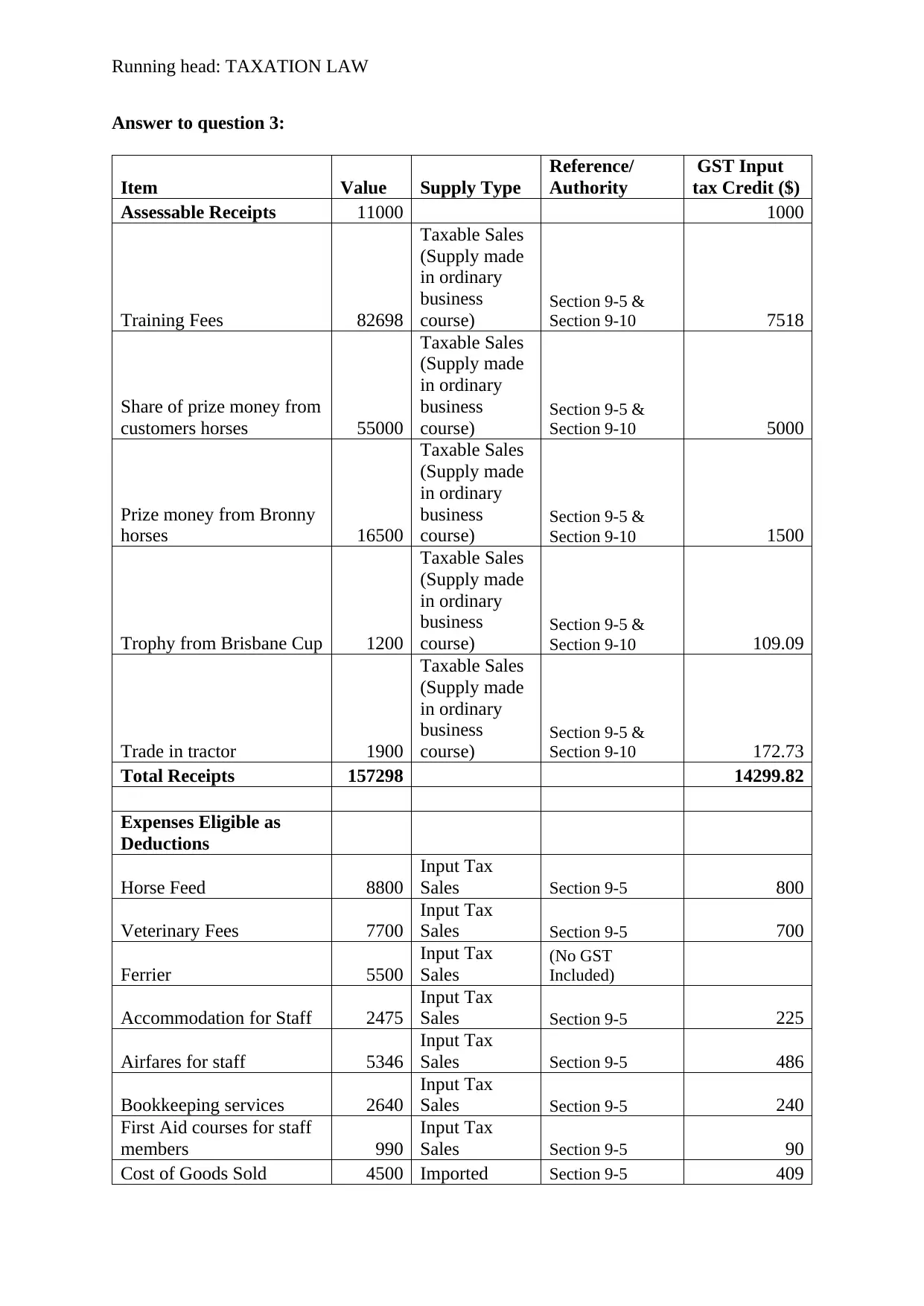
Running head: TAXATION LAW
Answer to question 3:
Item Value Supply Type
Reference/
Authority
GST Input
tax Credit ($)
Assessable Receipts 11000 1000
Training Fees 82698
Taxable Sales
(Supply made
in ordinary
business
course)
Section 9-5 &
Section 9-10 7518
Share of prize money from
customers horses 55000
Taxable Sales
(Supply made
in ordinary
business
course)
Section 9-5 &
Section 9-10 5000
Prize money from Bronny
horses 16500
Taxable Sales
(Supply made
in ordinary
business
course)
Section 9-5 &
Section 9-10 1500
Trophy from Brisbane Cup 1200
Taxable Sales
(Supply made
in ordinary
business
course)
Section 9-5 &
Section 9-10 109.09
Trade in tractor 1900
Taxable Sales
(Supply made
in ordinary
business
course)
Section 9-5 &
Section 9-10 172.73
Total Receipts 157298 14299.82
Expenses Eligible as
Deductions
Horse Feed 8800
Input Tax
Sales Section 9-5 800
Veterinary Fees 7700
Input Tax
Sales Section 9-5 700
Ferrier 5500
Input Tax
Sales
(No GST
Included)
Accommodation for Staff 2475
Input Tax
Sales Section 9-5 225
Airfares for staff 5346
Input Tax
Sales Section 9-5 486
Bookkeeping services 2640
Input Tax
Sales Section 9-5 240
First Aid courses for staff
members 990
Input Tax
Sales Section 9-5 90
Cost of Goods Sold 4500 Imported Section 9-5 409
Answer to question 3:
Item Value Supply Type
Reference/
Authority
GST Input
tax Credit ($)
Assessable Receipts 11000 1000
Training Fees 82698
Taxable Sales
(Supply made
in ordinary
business
course)
Section 9-5 &
Section 9-10 7518
Share of prize money from
customers horses 55000
Taxable Sales
(Supply made
in ordinary
business
course)
Section 9-5 &
Section 9-10 5000
Prize money from Bronny
horses 16500
Taxable Sales
(Supply made
in ordinary
business
course)
Section 9-5 &
Section 9-10 1500
Trophy from Brisbane Cup 1200
Taxable Sales
(Supply made
in ordinary
business
course)
Section 9-5 &
Section 9-10 109.09
Trade in tractor 1900
Taxable Sales
(Supply made
in ordinary
business
course)
Section 9-5 &
Section 9-10 172.73
Total Receipts 157298 14299.82
Expenses Eligible as
Deductions
Horse Feed 8800
Input Tax
Sales Section 9-5 800
Veterinary Fees 7700
Input Tax
Sales Section 9-5 700
Ferrier 5500
Input Tax
Sales
(No GST
Included)
Accommodation for Staff 2475
Input Tax
Sales Section 9-5 225
Airfares for staff 5346
Input Tax
Sales Section 9-5 486
Bookkeeping services 2640
Input Tax
Sales Section 9-5 240
First Aid courses for staff
members 990
Input Tax
Sales Section 9-5 90
Cost of Goods Sold 4500 Imported Section 9-5 409
Paraphrase This Document
Need a fresh take? Get an instant paraphrase of this document with our AI Paraphraser
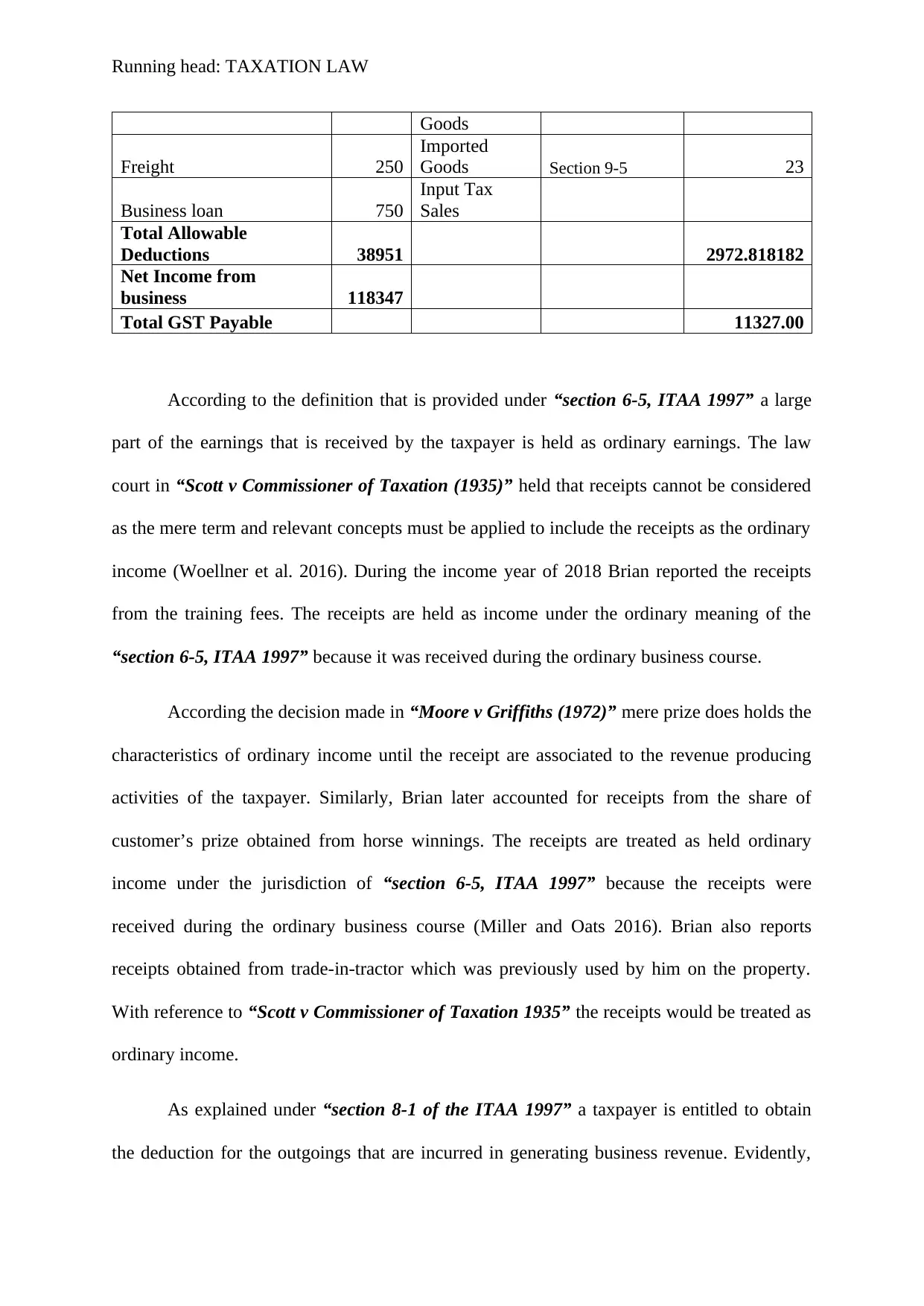
Running head: TAXATION LAW
Goods
Freight 250
Imported
Goods Section 9-5 23
Business loan 750
Input Tax
Sales
Total Allowable
Deductions 38951 2972.818182
Net Income from
business 118347
Total GST Payable 11327.00
According to the definition that is provided under “section 6-5, ITAA 1997” a large
part of the earnings that is received by the taxpayer is held as ordinary earnings. The law
court in “Scott v Commissioner of Taxation (1935)” held that receipts cannot be considered
as the mere term and relevant concepts must be applied to include the receipts as the ordinary
income (Woellner et al. 2016). During the income year of 2018 Brian reported the receipts
from the training fees. The receipts are held as income under the ordinary meaning of the
“section 6-5, ITAA 1997” because it was received during the ordinary business course.
According the decision made in “Moore v Griffiths (1972)” mere prize does holds the
characteristics of ordinary income until the receipt are associated to the revenue producing
activities of the taxpayer. Similarly, Brian later accounted for receipts from the share of
customer’s prize obtained from horse winnings. The receipts are treated as held ordinary
income under the jurisdiction of “section 6-5, ITAA 1997” because the receipts were
received during the ordinary business course (Miller and Oats 2016). Brian also reports
receipts obtained from trade-in-tractor which was previously used by him on the property.
With reference to “Scott v Commissioner of Taxation 1935” the receipts would be treated as
ordinary income.
As explained under “section 8-1 of the ITAA 1997” a taxpayer is entitled to obtain
the deduction for the outgoings that are incurred in generating business revenue. Evidently,
Goods
Freight 250
Imported
Goods Section 9-5 23
Business loan 750
Input Tax
Sales
Total Allowable
Deductions 38951 2972.818182
Net Income from
business 118347
Total GST Payable 11327.00
According to the definition that is provided under “section 6-5, ITAA 1997” a large
part of the earnings that is received by the taxpayer is held as ordinary earnings. The law
court in “Scott v Commissioner of Taxation (1935)” held that receipts cannot be considered
as the mere term and relevant concepts must be applied to include the receipts as the ordinary
income (Woellner et al. 2016). During the income year of 2018 Brian reported the receipts
from the training fees. The receipts are held as income under the ordinary meaning of the
“section 6-5, ITAA 1997” because it was received during the ordinary business course.
According the decision made in “Moore v Griffiths (1972)” mere prize does holds the
characteristics of ordinary income until the receipt are associated to the revenue producing
activities of the taxpayer. Similarly, Brian later accounted for receipts from the share of
customer’s prize obtained from horse winnings. The receipts are treated as held ordinary
income under the jurisdiction of “section 6-5, ITAA 1997” because the receipts were
received during the ordinary business course (Miller and Oats 2016). Brian also reports
receipts obtained from trade-in-tractor which was previously used by him on the property.
With reference to “Scott v Commissioner of Taxation 1935” the receipts would be treated as
ordinary income.
As explained under “section 8-1 of the ITAA 1997” a taxpayer is entitled to obtain
the deduction for the outgoings that are incurred in generating business revenue. Evidently,
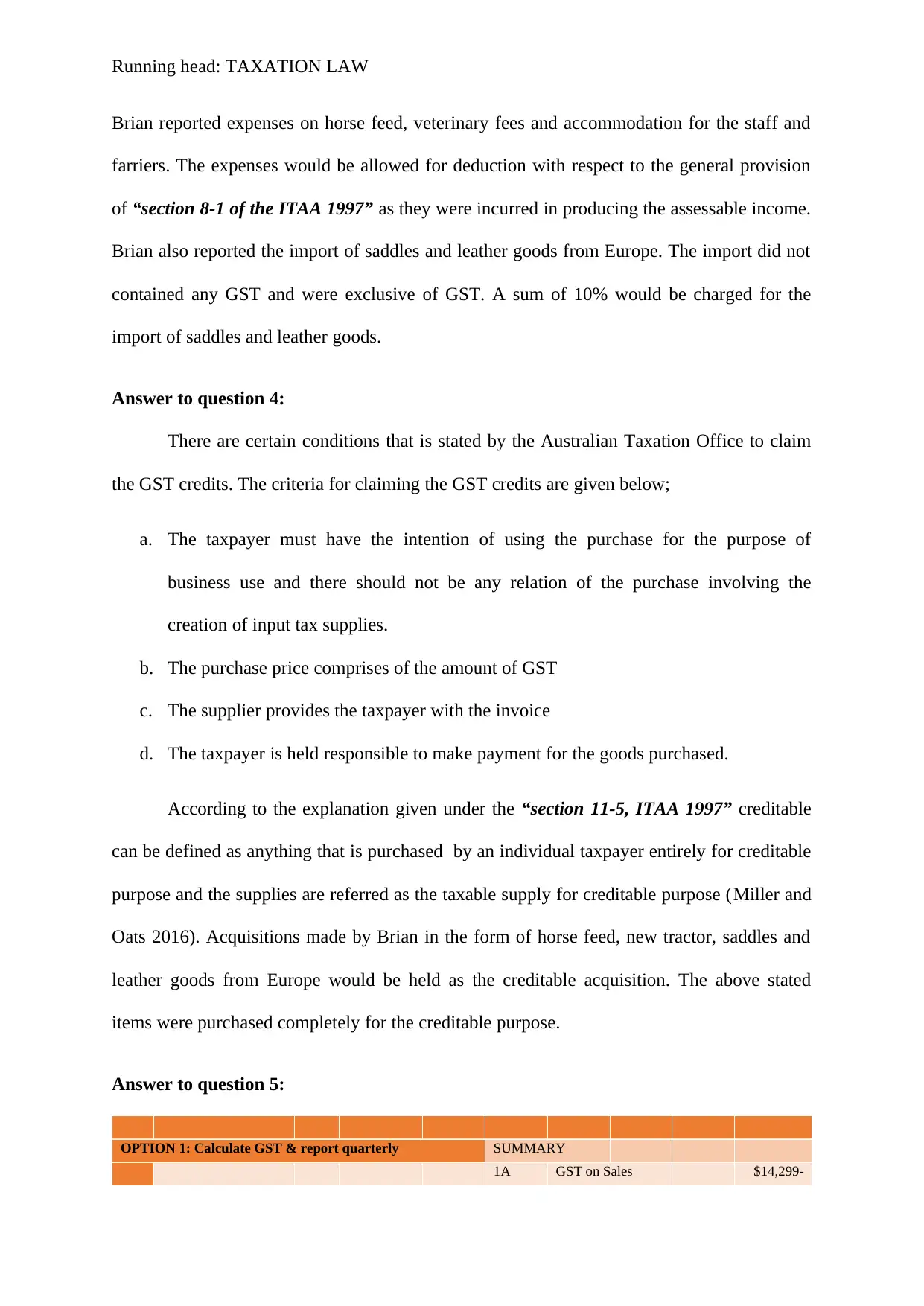
Running head: TAXATION LAW
Brian reported expenses on horse feed, veterinary fees and accommodation for the staff and
farriers. The expenses would be allowed for deduction with respect to the general provision
of “section 8-1 of the ITAA 1997” as they were incurred in producing the assessable income.
Brian also reported the import of saddles and leather goods from Europe. The import did not
contained any GST and were exclusive of GST. A sum of 10% would be charged for the
import of saddles and leather goods.
Answer to question 4:
There are certain conditions that is stated by the Australian Taxation Office to claim
the GST credits. The criteria for claiming the GST credits are given below;
a. The taxpayer must have the intention of using the purchase for the purpose of
business use and there should not be any relation of the purchase involving the
creation of input tax supplies.
b. The purchase price comprises of the amount of GST
c. The supplier provides the taxpayer with the invoice
d. The taxpayer is held responsible to make payment for the goods purchased.
According to the explanation given under the “section 11-5, ITAA 1997” creditable
can be defined as anything that is purchased by an individual taxpayer entirely for creditable
purpose and the supplies are referred as the taxable supply for creditable purpose (Miller and
Oats 2016). Acquisitions made by Brian in the form of horse feed, new tractor, saddles and
leather goods from Europe would be held as the creditable acquisition. The above stated
items were purchased completely for the creditable purpose.
Answer to question 5:
OPTION 1: Calculate GST & report quarterly SUMMARY
1A GST on Sales $14,299-
Brian reported expenses on horse feed, veterinary fees and accommodation for the staff and
farriers. The expenses would be allowed for deduction with respect to the general provision
of “section 8-1 of the ITAA 1997” as they were incurred in producing the assessable income.
Brian also reported the import of saddles and leather goods from Europe. The import did not
contained any GST and were exclusive of GST. A sum of 10% would be charged for the
import of saddles and leather goods.
Answer to question 4:
There are certain conditions that is stated by the Australian Taxation Office to claim
the GST credits. The criteria for claiming the GST credits are given below;
a. The taxpayer must have the intention of using the purchase for the purpose of
business use and there should not be any relation of the purchase involving the
creation of input tax supplies.
b. The purchase price comprises of the amount of GST
c. The supplier provides the taxpayer with the invoice
d. The taxpayer is held responsible to make payment for the goods purchased.
According to the explanation given under the “section 11-5, ITAA 1997” creditable
can be defined as anything that is purchased by an individual taxpayer entirely for creditable
purpose and the supplies are referred as the taxable supply for creditable purpose (Miller and
Oats 2016). Acquisitions made by Brian in the form of horse feed, new tractor, saddles and
leather goods from Europe would be held as the creditable acquisition. The above stated
items were purchased completely for the creditable purpose.
Answer to question 5:
OPTION 1: Calculate GST & report quarterly SUMMARY
1A GST on Sales $14,299-
⊘ This is a preview!⊘
Do you want full access?
Subscribe today to unlock all pages.

Trusted by 1+ million students worldwide
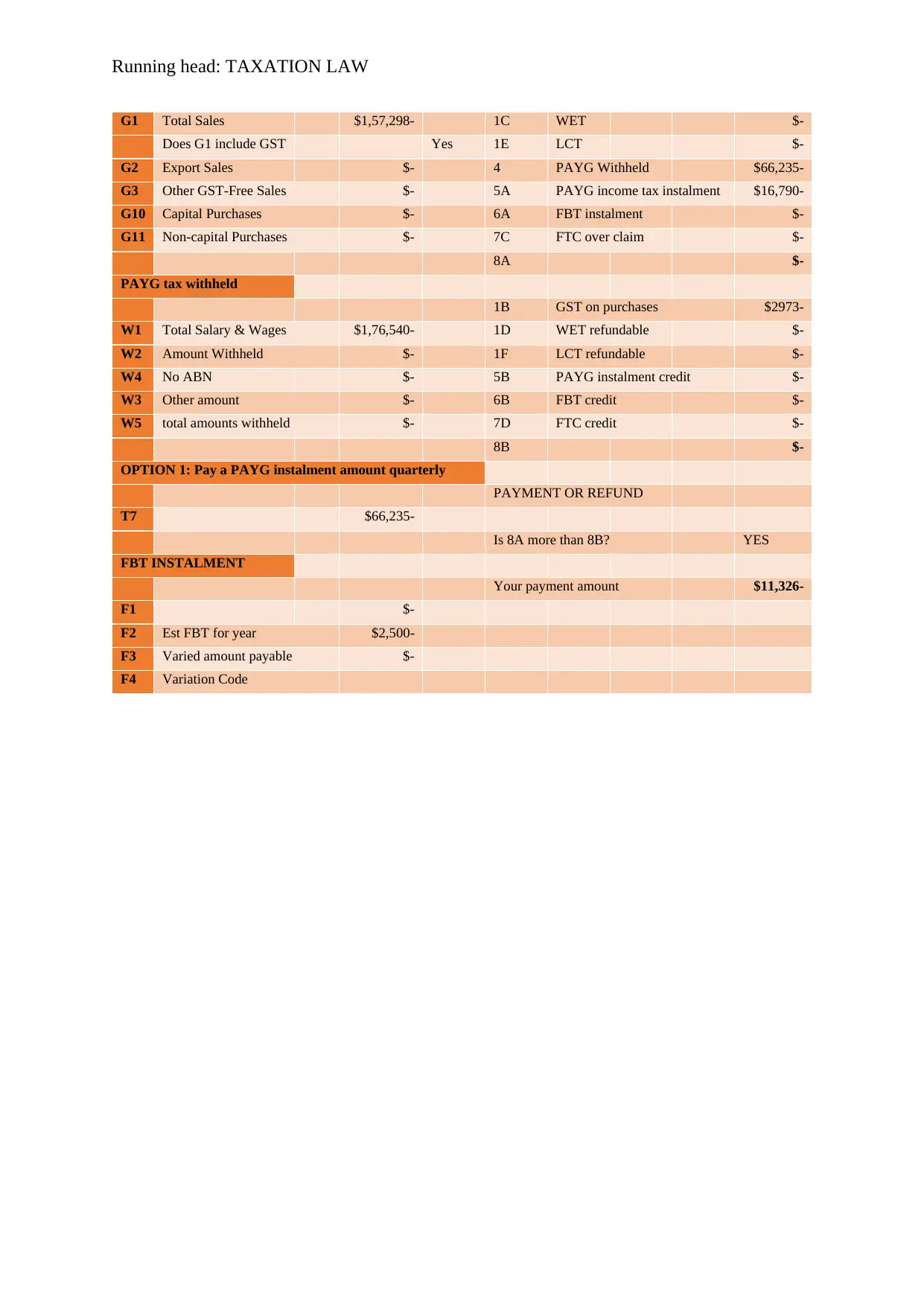
Running head: TAXATION LAW
G1 Total Sales $1,57,298- 1C WET $-
Does G1 include GST Yes 1E LCT $-
G2 Export Sales $- 4 PAYG Withheld $66,235-
G3 Other GST-Free Sales $- 5A PAYG income tax instalment $16,790-
G10 Capital Purchases $- 6A FBT instalment $-
G11 Non-capital Purchases $- 7C FTC over claim $-
8A $-
PAYG tax withheld
1B GST on purchases $2973-
W1 Total Salary & Wages $1,76,540- 1D WET refundable $-
W2 Amount Withheld $- 1F LCT refundable $-
W4 No ABN $- 5B PAYG instalment credit $-
W3 Other amount $- 6B FBT credit $-
W5 total amounts withheld $- 7D FTC credit $-
8B $-
OPTION 1: Pay a PAYG instalment amount quarterly
PAYMENT OR REFUND
T7 $66,235-
Is 8A more than 8B? YES
FBT INSTALMENT
Your payment amount $11,326-
F1 $-
F2 Est FBT for year $2,500-
F3 Varied amount payable $-
F4 Variation Code
G1 Total Sales $1,57,298- 1C WET $-
Does G1 include GST Yes 1E LCT $-
G2 Export Sales $- 4 PAYG Withheld $66,235-
G3 Other GST-Free Sales $- 5A PAYG income tax instalment $16,790-
G10 Capital Purchases $- 6A FBT instalment $-
G11 Non-capital Purchases $- 7C FTC over claim $-
8A $-
PAYG tax withheld
1B GST on purchases $2973-
W1 Total Salary & Wages $1,76,540- 1D WET refundable $-
W2 Amount Withheld $- 1F LCT refundable $-
W4 No ABN $- 5B PAYG instalment credit $-
W3 Other amount $- 6B FBT credit $-
W5 total amounts withheld $- 7D FTC credit $-
8B $-
OPTION 1: Pay a PAYG instalment amount quarterly
PAYMENT OR REFUND
T7 $66,235-
Is 8A more than 8B? YES
FBT INSTALMENT
Your payment amount $11,326-
F1 $-
F2 Est FBT for year $2,500-
F3 Varied amount payable $-
F4 Variation Code
Paraphrase This Document
Need a fresh take? Get an instant paraphrase of this document with our AI Paraphraser
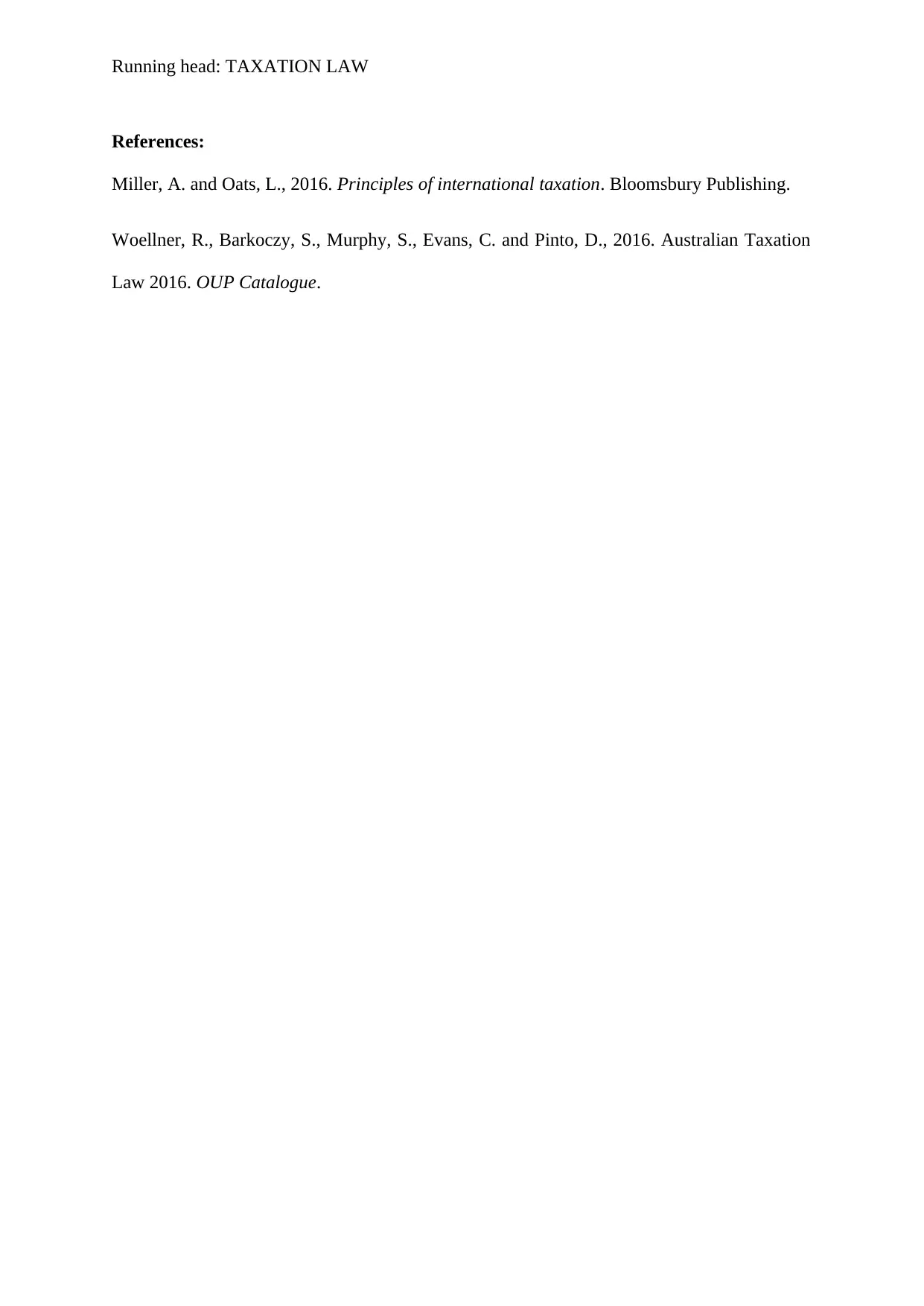
Running head: TAXATION LAW
References:
Miller, A. and Oats, L., 2016. Principles of international taxation. Bloomsbury Publishing.
Woellner, R., Barkoczy, S., Murphy, S., Evans, C. and Pinto, D., 2016. Australian Taxation
Law 2016. OUP Catalogue.
References:
Miller, A. and Oats, L., 2016. Principles of international taxation. Bloomsbury Publishing.
Woellner, R., Barkoczy, S., Murphy, S., Evans, C. and Pinto, D., 2016. Australian Taxation
Law 2016. OUP Catalogue.
1 out of 8
Related Documents
Your All-in-One AI-Powered Toolkit for Academic Success.
+13062052269
info@desklib.com
Available 24*7 on WhatsApp / Email
![[object Object]](/_next/static/media/star-bottom.7253800d.svg)
Unlock your academic potential
Copyright © 2020–2026 A2Z Services. All Rights Reserved. Developed and managed by ZUCOL.



